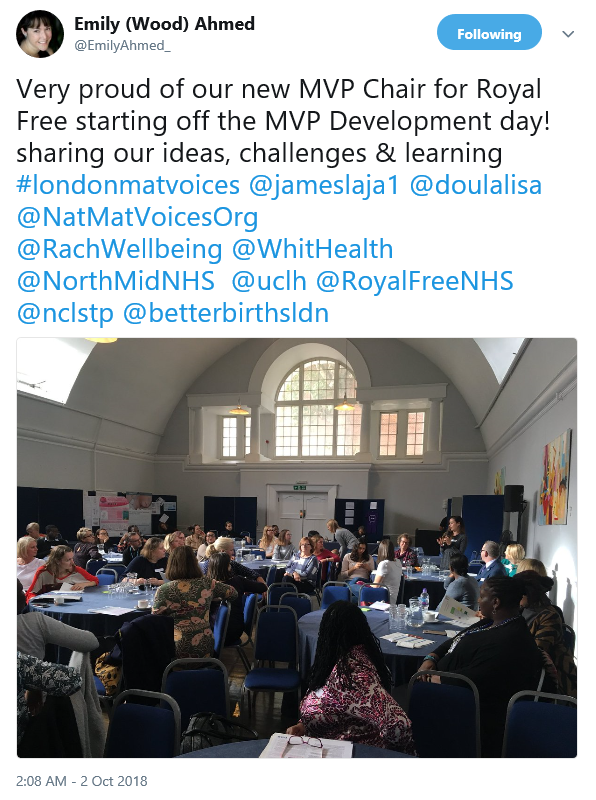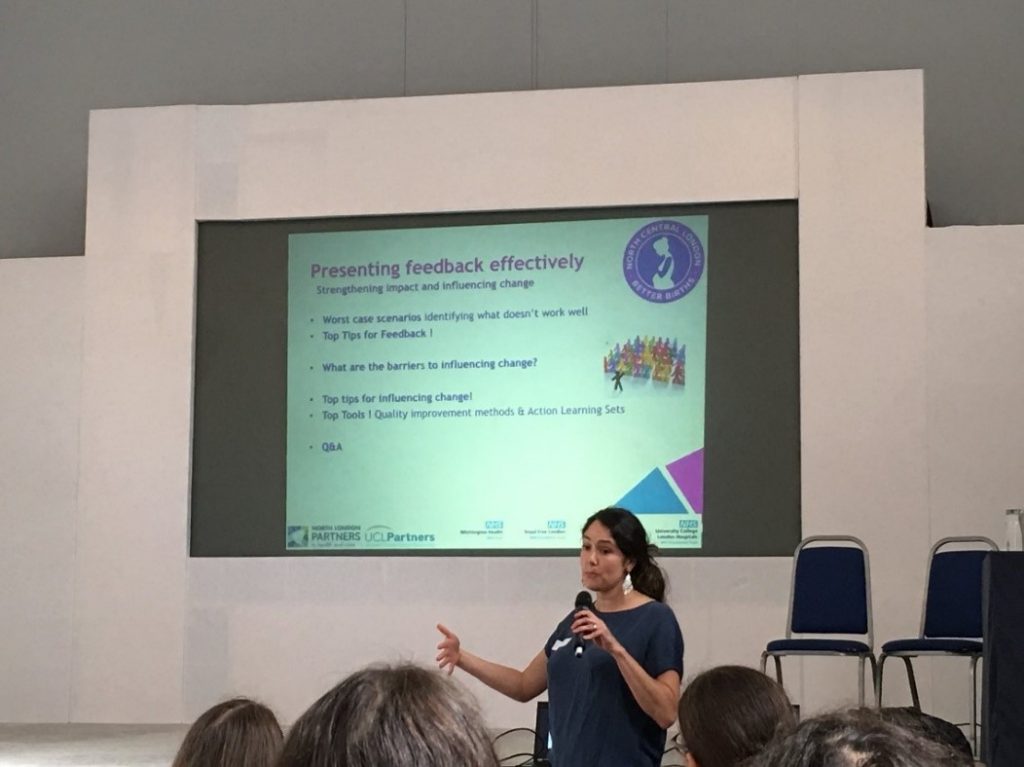Laura James and Florence Wilcock
On October 2, around 100 delegates from the 21 Maternity Voices Partnerships (MVP) across the five Local Maternity Systems in London came together at the second annual London MVP development day to share learning and triumphs, reflect on where they are and where they want to be.

London Maternity Clinical Network lead Emily Webster started by providing some context and then we, as co-chairs of the London MVP strategic group, introduced the day by giving an overview of what’s happened in the last year (the capital has gone from around 12 MVPs to 21, with the majority being funded in some way), the aims and objectives of the strategic group, which are:
- To ensure every MVP in London receives adequate funding. To this end we have produced the London CN commissioning guidance for effective co-production with MVPs
- To network and support the chairs of MVPs, face to face and via social media.
- To ensure every woman knows about her local MVP and how to feed into it and become a member if she would like. We have worked to ensure that all London MVPs are on the map on the myhealthLondon website
We also outlined the aims of the day; really encouraging people to reach out, network with each other and have those important conversations, which are sometimes challenging, about where we really are in terms of working relationships and what needs to be done to move forward. Delegates were invited to write any questions that sprung to mind on a ‘park it’ sheet at the back of the room.
The morning kicked off in earnest with headlines from one MVP from each of the 5 London Local Maternity Systems. It was wonderful to hear the work that is being done across London and also fantastic to hear from chairs from MVPs at different levels of maturity:
Next it was the turn of Roz Webb, chair of the Whittington MVP, and Lisa Ramsey, service user voice policy manager at the Maternity Transformation Programme, to showcase 15 Steps for Maternity and the Whittington’s experience of piloting this multidisciplinary toolkit. Roz outlined the challenges but also the fact that spending a whole day together really helped unite the group, which included commissioners, midwives, patient experience leads and service users. There is much more about the 15 Steps toolkit and some case studies on the National Maternity Voices website.
After a brief coffee it was time for a series of interactive seminars. The seminar topics were based on feedback from London MVP chairs about what they would like more support with.
To ease logistics, delegates were split into their LMS groups and each of the seminar presenters moved from one room to the next to deliver their workshops. While it did give the impression of speed-dating somewhat, it was much easier having three people move than 100!
Emily Ahmed from Better Births North Central London gave a fantastic workshop on presenting feedback effectively, what some of the barriers might be to influencing change, and what to do about them. She asked us to imagine a time when we have seen feedback used ineffectively and suggested that doing the opposite easily generates a ‘top tip’. Emily also pointed out that we can be much more receptive to criticism if we receive some positive feedback first.
Catherine Williams from National Maternity Voices talked to the groups about promoting and publicising their MVPs. She outlined the fact that Maternity Voices Partnerships are multidisciplinary NHS working groups, not legal entities in their own right, and as such cannot be contracted. She asked us to think strategically about raising awareness of MVP work for example at Trust board, CCG and Local Maternity System levels. She also signposted the groups to a variety of different resources on the National Maternity Voices website, including a new generic flyer that MVPs can customise easily. She also asked the group to consider this acronym when thinking about promoting their work:
P – what is your purpose?
A – who is your audience?
C – what is your community?
K – know your limits (and then stretch them if you can).
Finally, Ceri Durham from Social Action for Health led a discussion about how to reach out to vulnerable groups and how to attract new members to an MVP. There was a really good discussion about the danger of using the term ‘vulnerable’ and a realisation that what women want and need is the same irrespective of their background: it boils down to safe and personalised care. Ceri emphasised the importance of thinking through what will work for local women and local staff, each MVP will be different. She invited us to get out & think through who is missing in terms of membership e.g. obstetricians in contrast to who is missing in terms of voice e.g. partners.
After an hour and a half of these back to back seminars, it was time for the delegates (and seminar presenters!) to have a well-earned break and a bit of time to reflect on the messages they had heard in the morning.
There was an opportunity over lunch for people to visit market stalls at the back of the room and make further connections. Delegates were able to learn more about:
- the midwifery unit standards with the Midwifery Unit Network, which networks and supports midwifery units throughout the UK.
- Birth Companions a charity which supports women experiencing severe disadvantage during pregnancy, birth and early parenting
- the REACH pregnancy programme, which is behind the group antenatal care project Pregnancy Circles.
- London neonatal operational delivery network (ODN), which networks and links clinicians, professionals and parents across the 27 neonatal or special care baby units in London.
- Cocoon Family support, a charity providing support for women and families in London affected by postnatal depression.
Local Maternity System conversations:
The afternoon session was an opportunity for each delegate to get into their own Local Maternity System (LMS) and have some dedicated time to talk about the challenges and opportunities of working together at an LMS level. Maternity Voices Partnerships differ from their predecessors, Maternity Service Liaison Committees (MSLCs) as they also have this strategic role on the Local Maternity System board, as set out in chapter 4 of the Better Births resource pack. Given the wide variety in maturity of MVPs across London, some LMS boards have more service user engagement on their boards than others.
Conversations varied at each Local Maternity System table, but all were provided with a range of coproduction tools to aid discussion. Delegates were asked where they felt service user engagement was in their Local Maternity System based on the Ladder of Engagement
There was also opportunity to use a Values and Manifesto tool from https://www.iriss.org.uk/resources/tools/co-production-project-planner to formulate some shared principles for working together and a rogues gallery to learn more about each other and promote collaborative working.
Plenary session:
At the end of the day, each Local Maternity System group was asked to feedback one key learning that they would take away from the group. There were some great action points, including using the 15 Steps for Maternity Toolkit and finding a way of ensuring that MVPs have a voice at LMS level.
A few questions and issues emerged from the ‘park it’ board.
- How do MVPs secure funding? Who pays?
The Better Births resource pack states: ‘The maternity commissioner is responsible for facilitating and organising any agreed funding’. (p.18) This means it is the responsibility of the Clinical Commissioning Groups to ensure MVPs are adequately resourced.
- Is there a network for chairs of MVPs?
YES! There is a multidisciplinary London MVP network Facebook group and a national MVP chairs peer support Facebook group. There is also a multidisciplinary National Maternity Voices Facebook group. There is also an opportunity for London chairs to meet face-to-face quarterly. Some have also created their own Local Maternity System networks.
- Training for chairs of MVPs
This request for further resources to support chairs is one that has been heard from various sources and requires further collaborative work from the London Clinical Network, the London MVP strategic group and National Maternity Voices. Watch this space!
The day finished with a chance for people to continue those important conversations and celebrate with each other. As people left, the buzz of chat and comments overheard suggested that they were feeling energised, supported and had relished the opportunity to come together. I think we can safely say that #LdnMatVoices18 was a great success. We’re already looking forward to #LdnMatVoices19!





